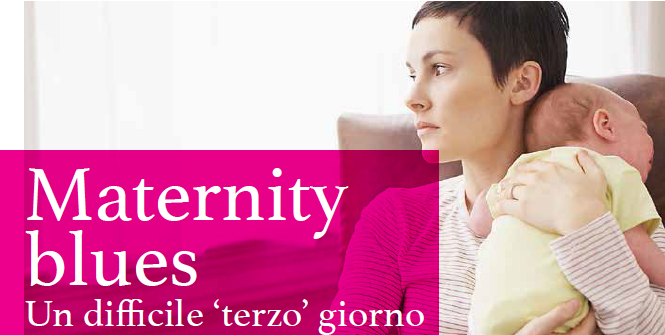 It is a completely physiological and common phase: the woman shows frequent mood swings and crying spells, she can be invaded by anxiety, doubts and worries - most of the time unjustified - which can concern the health of the child (is she okay? Is she growing well? Is it healthy?) but also their own parenting skills (am I doing well? Will I make it?). The fact that society experiences motherhood as an exclusively happy event, and finds it difficult to accept these feelings, does not help the woman, who often masks her state of mind with an apparent joy. Instead, the new mother should feel free to cry and let off steam, finding a shoulder in your partner, friends and family to express your doubts and fears. Skin-to-skin contact with the newborn is very effective for a quick recovery. Fortunately, this emotional reaction ( which is widespread among about 60% of mothers, while only 20% of women who have experienced the maternity blues reach postpartum depression ) lasts a maximum of ten days and tends to gradually decrease.
Taken from Born Mom | by Laura Sciolla
It is a completely physiological and common phase: the woman shows frequent mood swings and crying spells, she can be invaded by anxiety, doubts and worries - most of the time unjustified - which can concern the health of the child (is she okay? Is she growing well? Is it healthy?) but also their own parenting skills (am I doing well? Will I make it?). The fact that society experiences motherhood as an exclusively happy event, and finds it difficult to accept these feelings, does not help the woman, who often masks her state of mind with an apparent joy. Instead, the new mother should feel free to cry and let off steam, finding a shoulder in your partner, friends and family to express your doubts and fears. Skin-to-skin contact with the newborn is very effective for a quick recovery. Fortunately, this emotional reaction ( which is widespread among about 60% of mothers, while only 20% of women who have experienced the maternity blues reach postpartum depression ) lasts a maximum of ten days and tends to gradually decrease.
Taken from Born Mom | by Laura Sciolla

Maternity blues: a difficult 'third' day
A child is born and happiness envelops an entire family. Yet, becoming a mother raises complex emotional experiences in every woman, which can sometimes lead to so-called postpartum depression. The most common symptoms are intense feelings of incompetence, sadness, shame, anger, difficulty sleeping, and decreased appetite . Sadness can be so pervasive as to make it difficult to relate or play with the newborn , to such an extent that the mother will tend to avoid contact and closeness, both physical and emotional. While not reaching real postpartum depression ( which will have to be dealt with seriously by contacting dedicated health facilities), in the first days of the baby's life it is easy for the new mother to experience an emotional state of profound sadness and fatigue : it is the so-called maternity blues , or 'third day syndrome'.  It is a completely physiological and common phase: the woman shows frequent mood swings and crying spells, she can be invaded by anxiety, doubts and worries - most of the time unjustified - which can concern the health of the child (is she okay? Is she growing well? Is it healthy?) but also their own parenting skills (am I doing well? Will I make it?). The fact that society experiences motherhood as an exclusively happy event, and finds it difficult to accept these feelings, does not help the woman, who often masks her state of mind with an apparent joy. Instead, the new mother should feel free to cry and let off steam, finding a shoulder in your partner, friends and family to express your doubts and fears. Skin-to-skin contact with the newborn is very effective for a quick recovery. Fortunately, this emotional reaction ( which is widespread among about 60% of mothers, while only 20% of women who have experienced the maternity blues reach postpartum depression ) lasts a maximum of ten days and tends to gradually decrease.
Taken from Born Mom | by Laura Sciolla
It is a completely physiological and common phase: the woman shows frequent mood swings and crying spells, she can be invaded by anxiety, doubts and worries - most of the time unjustified - which can concern the health of the child (is she okay? Is she growing well? Is it healthy?) but also their own parenting skills (am I doing well? Will I make it?). The fact that society experiences motherhood as an exclusively happy event, and finds it difficult to accept these feelings, does not help the woman, who often masks her state of mind with an apparent joy. Instead, the new mother should feel free to cry and let off steam, finding a shoulder in your partner, friends and family to express your doubts and fears. Skin-to-skin contact with the newborn is very effective for a quick recovery. Fortunately, this emotional reaction ( which is widespread among about 60% of mothers, while only 20% of women who have experienced the maternity blues reach postpartum depression ) lasts a maximum of ten days and tends to gradually decrease.
Taken from Born Mom | by Laura Sciolla
 It is a completely physiological and common phase: the woman shows frequent mood swings and crying spells, she can be invaded by anxiety, doubts and worries - most of the time unjustified - which can concern the health of the child (is she okay? Is she growing well? Is it healthy?) but also their own parenting skills (am I doing well? Will I make it?). The fact that society experiences motherhood as an exclusively happy event, and finds it difficult to accept these feelings, does not help the woman, who often masks her state of mind with an apparent joy. Instead, the new mother should feel free to cry and let off steam, finding a shoulder in your partner, friends and family to express your doubts and fears. Skin-to-skin contact with the newborn is very effective for a quick recovery. Fortunately, this emotional reaction ( which is widespread among about 60% of mothers, while only 20% of women who have experienced the maternity blues reach postpartum depression ) lasts a maximum of ten days and tends to gradually decrease.
Taken from Born Mom | by Laura Sciolla
It is a completely physiological and common phase: the woman shows frequent mood swings and crying spells, she can be invaded by anxiety, doubts and worries - most of the time unjustified - which can concern the health of the child (is she okay? Is she growing well? Is it healthy?) but also their own parenting skills (am I doing well? Will I make it?). The fact that society experiences motherhood as an exclusively happy event, and finds it difficult to accept these feelings, does not help the woman, who often masks her state of mind with an apparent joy. Instead, the new mother should feel free to cry and let off steam, finding a shoulder in your partner, friends and family to express your doubts and fears. Skin-to-skin contact with the newborn is very effective for a quick recovery. Fortunately, this emotional reaction ( which is widespread among about 60% of mothers, while only 20% of women who have experienced the maternity blues reach postpartum depression ) lasts a maximum of ten days and tends to gradually decrease.
Taken from Born Mom | by Laura Sciolla
Categorie del blog
Flyer


